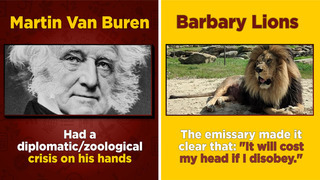U.S. Presidents Can't Really Accept Gifts (Except For Occasional Lions)

It's Bribery 101. You go to a foreign official, put a bag of unmarked bills on their desk, say you're going to step outside for a minute, and, crucially, give them an overexaggerated wink. That kind of offer is hard to ignore. Especially when, instead of leaving a bag of cash, you're dropping off two wild apex predators.

Since the Founding Fathers had fought an entire war to be freed from Europe's oppressive influence, it made sense that they'd want it in writing. So when enacting the new Constitution in 1787, they added a clause banning foreign emoluments or: receiving lavish gifts from overseas monarchs in obvious attempts to bribe the president. But it turns out that they needn't have worried as much about sinister kings as eccentric sultans. Something President Martin Van Buren realized when a couple of them made him an offer he couldn't refuse. An offer to start his own zoo.
Don't Miss
In 1840, The United States was visited by the first-ever Arab envoy to the New World: an emissary of Oman's Said bin Sultan Al-Busaidi, also known as Said the Great. And as newcomers, they obviously hadn't gotten the memo on the new gift-giving policy. When the ship Al-Sultanah docked in New York City, it immediately presented President Van Buren with a wealth of pearls, Kashmir scarves, an ornate sword, and, most problematically, a pair of thoroughbred horses. Van Buren immediately wrote a diplomatically sensitive message to the sultan, explaining that he couldn't take the reins of the horses (or even feed them, for that matter) without breaking the law.

At the same time, Van Buren was having a similarly zoological diplomatic crisis in Morocco. He had received a panicked letter from the American consul in Tangiers, Thomas N. Carr, explaining that he had had a very aggressive visit from the Sultan Abd al-Rahman, the country's no-nonsense ruler. After a parade of soldiers marched to the consulate, an emissary presented Carr with the presidential gift of a pair of Barbary lions, a prehistoric breed of "enormous, magnificent" cats that have since gone extinct. When Carr tried to refuse the gift, the emissary made it clear that: "It will cost my head if I disobey." Carr was given two options: either take the massive lions or have them released in the street in front of the consulate. So he felt he had no choice but to invite in his new royal guests from the animal kingdom.

The two lions remained a thorn in Carr's paw for most of 1840 as they paced around the tiny American consulate while Congress figured out what to do with them. Eventually, they gave Van Buren special permission to accept both sultans' extravagant gifts under the condition that they were sold off immediately and the profits put into the Treasury. The lions were shipped off to Pennsylvania, where they were auctioned off for $375. Today, an amended rule to the emolument clause states that government employees cannot accept gifts worth more than (you guessed it) $390. But try finding a pair of lions that cheap these days.
For more weird tangents, do follow Cedric on Twitter.
Top Image: The White House / Nelson Robinson, Wikimedia Commons